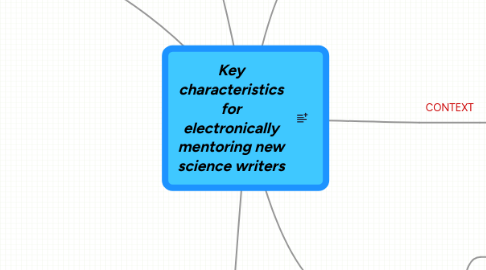
1. asynchronous; detailed individualised feedback
2. SHARED SPACES
2.1. shared space
2.1.1. instructors support instructors
2.1.2. dialogues: between expert and markers; otherwise no
2.1.3. reflection - yes, for instructors, project is action research
2.1.4. observing best practice - students' best writing provides models for others
2.1.5. taking risks
2.2. making connections
2.2.1. links to real-life - applicable to all science writing tasks in general
3. ACTIVITIES
3.1. flexible
3.1.1. feedback is text only: no provision for different learning styles
3.2. pedagogy
3.2.1. strong pedagogical model for process and directed outcomes
3.3. opportunities for learning
4. COLLABORATION
4.1. collaboration
4.1.1. no collaboration between students
4.2. cooperation
4.2.1. learning model is non-cooperative
4.3. communication
4.3.1. communication between instructors and students is highly regulated
5. INTEGRATION
5.1. constructive environment
5.1.1. learners create their own representation of course content
5.2. integration
5.2.1. training in genre-first assessment integrated with technical training
5.3. adding value
5.3.1. quick turnaround in marking allows multiple versions, timely feedback
6. CONTEXT
6.1. context of organisation
6.1.1. academic; cross-discipline project; CityU English is L2; USyd markers may be English L1 or L2
6.2. context of communication
6.2.1. students are apprenticed in a discipline-specific genre
6.3. context of science
6.3.1. academic writing characteristics valued in science: objectivity; brevity; relevance; evidence

